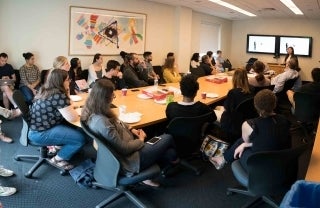
Curriculum and Milestones
Our five-year Ph.D. program encourages students to design a course of study that suits their unique interests in the interdisciplinary field of Communication.
Earning a Ph.D. is a transformative process that can open doors to many different career options. By nature, Communication is highly interdisciplinary, and our faculty and students bring to the school a tremendous diversity of backgrounds and interests.
Unlike programs that direct students into “tracks,” the Annenberg School encourages its students to design a curriculum that suits their own particular interests. It also embraces multimodal scholarship that utilizes forms such as film, audio, visual art, and performance.
The Annenberg Ph.D. program represents a five-year commitment. The classroom experience is designed to help students develop a methodological toolkit that allows them to approach any research question and gain a rigorous theoretical grounding in the field.
From the earliest days of their program, students have the opportunity to partner with faculty on research, and to develop plans for their own. Ultimately, these research projects lead a student to develop their dissertation.
A typical timeline for a student entering ASC without a Master’s degree is:
- Six semesters of coursework, typically three courses per semester
- Four required classes: Proseminar, quantitative research methods, qualitative research methods and statistics
- Comprehensive Exams at the end of semester 4
- A dissertation proposal defense in semesters 6 or 7
- Dissertation research and writing in semesters 7 through 10
- Dissertation defense and graduation at the end of semester 10
Continue reading to learn more about the coursework and milestone events involved with earning an Annenberg Ph.D.
The Curriculum
The Annenberg Ph.D. program is structured to provide flexibility for students, in regular consultation with their advisors, to design a personalized curriculum tailored to their specific interests. A well-chosen set of courses should provide students with an understanding of the field broadly, coupled with more in-depth knowledge of the theories, methods, and research findings most relevant to their area of specialization.
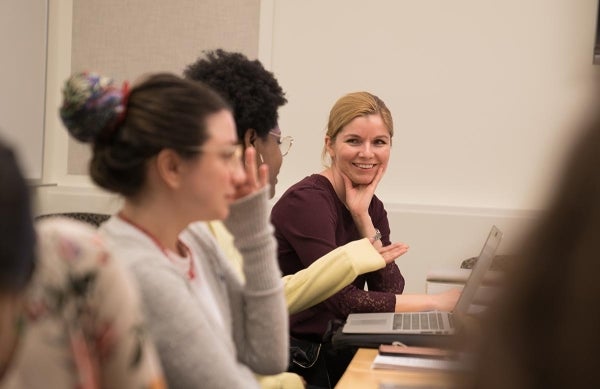
A minimum of seventeen classes are required for the Ph.D.; up to four of these may be transferred from a previous Master’s program with approval from the student’s academic advisor.
All students are required to take a Proseminar (COMM 500) in their first semester. This course provides an introduction to the field of Communication and is taught each week by a different member of the graduate faculty, giving students a chance to get to know them further.
Students are also required to take the methods-focused Introduction to Communication Research (COMM 5220) and Qualitative Ways of Knowing (COMM 5230) at Annenberg and an introductory statistics course (most commonly those offered through the Department of Sociology, Political Science or the Wharton School).
While no other specific courses are required, all Ph.D. students must take a course with each of at least five different members of the ASC graduate faculty, with the goal of ensuring students encounter a diverse range of approaches to Communication.
Annenberg offers more than a dozen graduate courses each semester, drawn from a list of 60 courses covering a wide range of topics related to communication and media. These courses are taught by our graduate faculty, as well as visiting faculty from around the globe.
Unlike programs that direct students into “tracks,” the Annenberg School encourages its students to design a curriculum that suits their own particular interests.
Students may take as many as six courses from outside the Annenberg School. Four of these may be courses students transfer in from other master’s degree programs, or those taken from any of Penn’s 12 graduate and professional schools.
Students typically take three courses per semester, though with permission from their advisor, they may enroll in as many as four.
In order to be considered in good academic standing and be eligible for funding, students must maintain a minimum grade point average of 3.0.
Program Milestones
Selecting an Advisor
Incoming students are assigned a faculty advisor when they enter the program, though it is not uncommon for students to change their advisor in the first year. Working together, the student and advisor will plan a course of study and research suitable to the student’s needs. The primary role of the advisor is to help the student determine how to develop expertise in the field through courses and research.
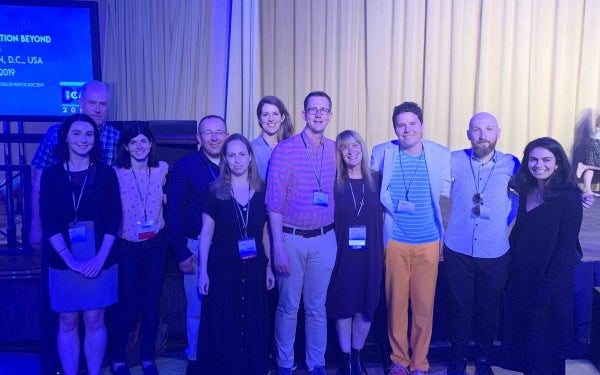
All first-year students are required to enroll in the faculty Proseminar (COMM 5000), a course designed to provide an opportunity for incoming students to become familiar with the ongoing research of the ASC standing faculty.
Every first-year and second-year student’s grades, along with their fellowship progress, will be closely monitored throughout the academic year. This process ensures that students are on track to meet their academic goals and fulfill the requirements of their programs. To facilitate this, the Graduate Dean will send detailed letters to each student as well as their academic advisors. These letters will not only provide an overview of the students' current progress but will also highlight any areas of concern that may need to be addressed.
By keeping both students and advisors informed, we aim to build an environment of open communication and support, allowing for timely interventions if necessary. It is important that students remain proactive about their academic journey and take advantage of the resources available to them.
Comprehensive Exam (Comps)
The Comprehensive Exam (Comps) evaluates a student’s knowledge of theory and methods in communication. Comps will be taken at a pre-determined week at the end of the second year. Comps will be based on a generated list of broad questions. The student will respond to two essays (open book – over a week) and defend their responses in an oral exam. The student’s Comps committee will review the essays and the oral exam.
If the student fails any part of the exam, the examining committee will decide whether the student must retake that part of the exam or take a new exam. Students who fail to pass any component of a retaken exam, whether in whole or in part, will not normally continue in the program except in exceptional circumstances. Once the student has passed the comprehensive exam, they are considered a “doctoral candidate.”
Dissertation Proposal
Before receiving their dissertation research fellowship, which offers funding for the fifth year of the program, and beginning work on the dissertation, each student submits a formal written dissertation proposal and defends it to their dissertation committee. The proposal is a full statement of the research problem, including its theoretical rationale and methodology.
A student’s dissertation committee, which will evaluate both the proposal and the completed dissertation, consists of three Annenberg standing faculty, plus faculty from other departments where appropriate. The student’s main academic advisor typically serves as the committee’s chair. The committee members serve as resources to the student throughout the dissertation process and offer constructive feedback.
Writing a Dissertation
The writing of a dissertation, which typically takes place over the course of a year or more, is the capstone of the Ph.D. and a monumental achievement. A finished dissertation should make an original contribution to knowledge, building upon the existing research and theories.
Written dissertations can run more than 100 pages in length, though there is no fixed requirement. On occasion, students have been permitted to incorporate film and other multimedia into their dissertation.
Depending on the nature of the research, students do not necessarily need to be in residence at Annenberg while writing a dissertation, though students living elsewhere typically return to complete their defense.
The Dissertation Defense
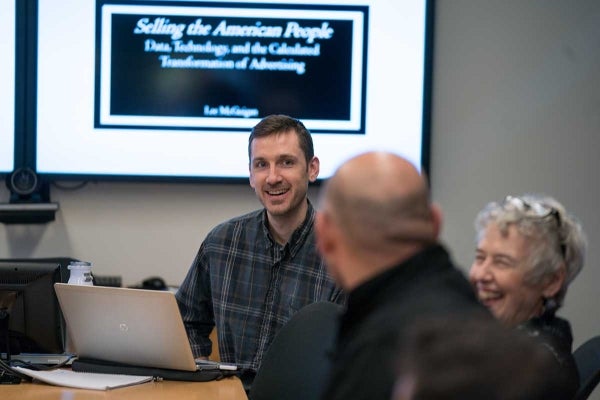
Once the dissertation is completed and submitted to the dissertation committee members for review, the student makes a public presentation followed by a private meeting with the committee in which the student is asked questions. The committee will then decide to accept the dissertation.
The community celebration following a dissertation defense is always a joyous one, honoring the monumental achievement of completing such a significant body of research. Following a successful dissertation, students can begin using the degree letters "Ph.D." after their names. The defense is fully complete when the student makes the revisions suggested by the committee and "deposits" a written copy with the University.
Graduation
Degrees are conferred in May, August, and December of each year, with formal commencement ceremonies taking place in May. The University of Pennsylvania requires students to complete their degree within 10 years of starting the program.
For More Information
More detail about each of the subjects above can be found in the graduate student handbook. The University of Pennsylvania also maintains academic rules for all its Ph.D. programs.
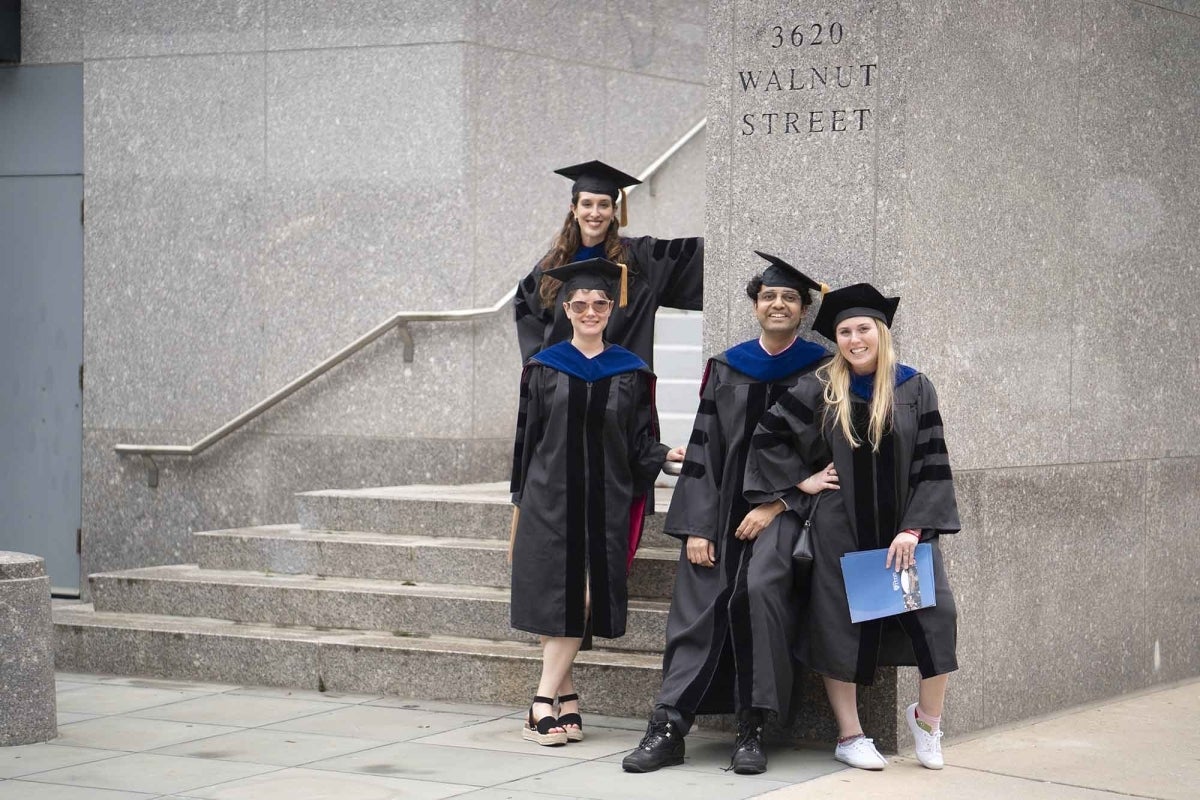
Student Voices
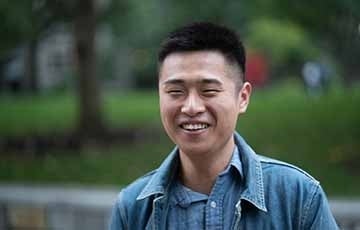
Tian Yang
“I feel very lucky to be a part of this community. I have had the opportunity to learn from those big names who repeatedly appear in my reference lists and Communication textbooks, and great support from faculty and staff that gives me the freedom to explore new research, even as a Ph.D. student.”
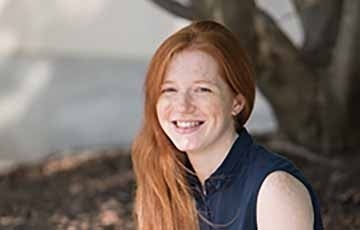
Sophie Maddocks
“Before pursuing a Ph.D., everyone told me the most important thing was to find the right advisors. During my first semester at Annenberg I found faculty who cared deeply about my academic progress and personal wellbeing. At school events I was able to dialogue in small groups with leading guest scholars in my field, finding mentors and building a diverse professional network.”
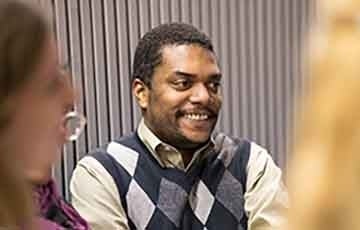
Antoine Haywood
“An outstanding quality of Annenberg’s Ph.D. program is the comradery within the graduate student cohorts. My cohort keeps me connected, grounded, and motivated. Genuine support exceeds superficial competitiveness. I have learned a lot from conversations and brainstorms I’ve shared with peers who are at different stages of the program.”
